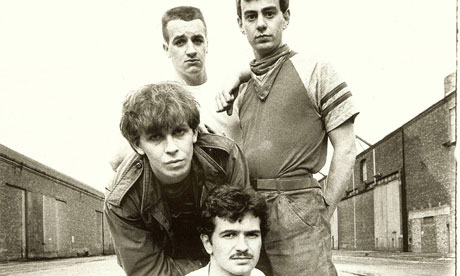
The 30th anniversary reissue of the Teardrop Explodes' Kilimanjaro recently spurred one heritage-rock magazine to ask the band's former frontman Julian Cope if he would ever return to writing pop music. It seems a fair enough query given Kilimanjaro's success: it spawned a top 10 hit in Reward, spent 35 weeks on the charts and displayed such commercial promise that both U2 and Duran Duran apparently considered the Teardrop Explodes their only real competition. You might also feel compelled to ask in light of Cope's latter- day musical output. That variously includes an hour-long homage to the late Princess of Wales called She-Diana; a live recording of his "proto-metal" band Brain Donor; and Spades & Hoes & Plows, a self-styled "masterpiece of agrarian doom-clod-plod" that features Cope accompanying singer David Wrench on "Mellotron and 26-inch marching bass drum", and culminates in an 18-minute instrumental inspired by a series of road-toll protests in 19th-century Wales. Alas, Helyntion Beca (The Rebecca Riots) seems to have been overlooked by the programmers of the Radio 1 playlist, a fate that also befell such other recent Cope numbers as All the Blowing-Themselves-Up Motherfuckers (Will Realise the Minute They Die That They Were Suckers).
Actually, Cope told the magazine, he'd just written a pop song, inspired by the mid-60s baroque style of the Left Banke, a band not so wildly removed from the kind of influences that powered Kilimanjaro – the blasting brass arrangements of Forever Changes-era Love, the Seeds' reedy garage rock, the sunshine pop of the Turtles. "It's called," he added, "The Cunts Can Fuck Off."
It's hard to reconcile the Julian Cope of today with the 22-year-old you hear on this 3CD deluxe reissue of the first album he made. There's something very fresh-faced about the music on Kilimanjaro, which replaced the murky, shaky, spindly sound of the Teardrops' early indie singles – collected on CD2 – with a sound that tapped into 60s psych's sunny optimism, rather than its creeping disquiet. Equally, though, there's something rather gimlet-eyed about it. You can hear an altogether more straightforward kind of ambition than that which presumably fuels the desire to record an 18-minute agrarian doom-clod-plod instrumental. Indeed, the Teardrop Explodes had a weird tendency to combine the wide eyes and the will to power in the same song. "Bless my cotton socks, I'm in the news!" opened Reward, while the faux-naif title and jaunty tune of Brave Boys Keep Their Promises cloaks a load of surprisingly Duncan Bannatyneish stuff about fighting your way to the top.
The path from there to here began towards the end of Kilimanjaro's recording, when the previously abstinent Cope was handed a joint by guitarist Alan Gill, prompting the singer to embark on one of rock history's more colourful drug binges. The ensuing bedlam is probably best sampled via Cope's incredible book Head On, less an autobiography than a monograph on the inadvisability of combining a sudden ascent to teenybop stardom with a diet largely comprised of LSD: "Every day we would wake up, take acid, then ride to the studio on our imaginary horses," begins one typical anecdote. That said, you certainly get a flavour from the nine-minute live version of Sleeping Gas included on CD2, during which an audibly off-his-cake Cope barks like a dog, threatens to attack the audience and offers musical recommendations: "Mercenaries by John Cale – have you heard it?" At one point, he shuts up for a couple of minutes, before explaining his silence: "The people at the front have been witnessing a face solo."
Head On succeeded in simultaneously sealing the Teardrop Explodes' legendary status while at the same time overshadowing their music, which struggles to make itself heard above the stories of drugged lunacy. But there wouldn't have been any stories of drugged lunacy had the Teardrop Explodes not been good at what they did in the first place. It's an infinitely more straightforward pop album than someone approaching it after reading Head On might expect, and Kilimanjaro gleams with concise jewels – only Sleeping Gas's cyclical motorik bassline hints at the weirdness to come. Five of its 11 songs were released as singles in one form or another, and listening to Treason or Bouncing Babies, you can see why Duran Duran got the fear. The tunes are uniformly fantastic (fantastic enough to overwhelm the production, even when it tends to early-80s chart-bothering smoothness), the words intriguing: long before he actually did create his own unique universe of megaliths, Odinism and krautrock, Cope was cramming his lyrics with enough off-kilter references to suggest he already had. And the sense of swaggering confidence never abates. It sounds like that most beguiling of things: a band at the top of their game. It sounds like a band that could have had it all. As it turned out, that was the last thing their frontman wanted.

